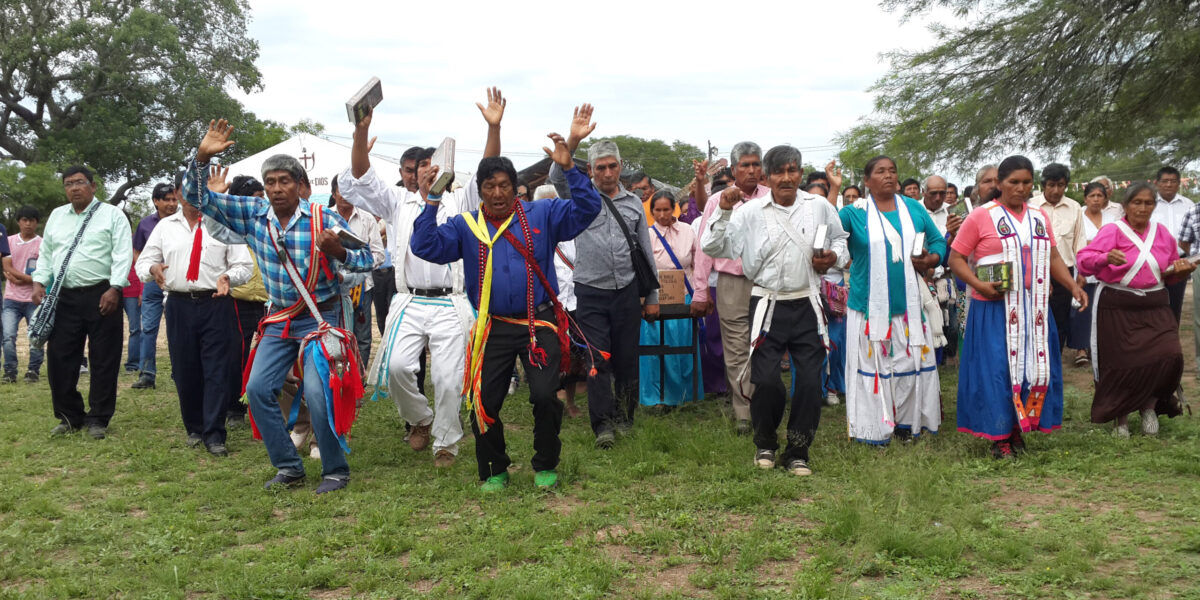ELKHART, Ind. (Mennonite Mission Network) — In the town of Fortín Lavalle, Argentina, 200 people celebrated the arrival of the Qom* Bibles at the Iglesia de Dios on Dec. 13, 2014. Songs, dance and prayer accompanied a procession of the Bibles from the entrance of the church property to the place of worship, underneath the shade of a grove of trees.
 Download full-resolution image.
Download full-resolution image.“Today we are recovering our religion, our worldview,” said Orlando Sánchez, in an article about the celebration on the Argentine Bible Society’s website. Sánchez is one of the translators, who also wrote a history about the different times when the community was involved in Bible translation projects.
This project to translate the parts of the Old Testament not previously translated, and to re-translate the New Testament to reflect current language, started in 2000. The translation required collaboration among the indigenous churches and believers, the Sociedad Bíblica Argentina (Argentine Bible Society), and the Mennonite team in the Chaco. Team members Luis Acosta and Richard Friesen coordinated indigenous translation teams. Other team members also helped in multiple ways.
The Sociedad Bíblica Argentina reported that Juan Victorica, a Qom leader who led the Dec. 13 event, mentioned how in the past, people told the Qom that “being a Christian was making yourself like the people of European descent and leaving behind the Qom.” This included leaving behind the Qom language.
 Download full-resolution image.
Download full-resolution image.Since then, the Qom have reclaimed their cultural identity in Christian expression. Victorica added that “God is a Qom God.”
In an article written in 2012, Rafael Mansilla, a Qom community leader, pastor and translator, said that although the Qom people have read the Bible in Spanish and portions in their own language for many years, the new translation will bring greater insights and understanding for native Qom speakers, who will finally be able to read the full Scriptures in their heart language.
Movie about Jesus’ life
Another recent translation project is the “the Jesus film”, a movie about Jesus’ life according to the Gospel of Luke.
A cast of 26 Qom voice actors read their parts in a recording studio set up in Alfonsina and José Oyanguren’s house. The Oyangurens, sent by the Bragado (Argentina) Mennonite Church and serving as international partnership associates with Mennonite Mission Network, helped coordinate this effort with the Evangelical Linguistic Missionary Association.
Two producers with the association, Laerte Zorzetti and Dan Kubitza, came to Castelli from Brazil in September.
“It was a lot of work since each reader had only seconds to dub their voices to the movement of the actors,” wrote Alfonsina and José Oyanguren in their prayer letter.
The Oyangurens explain that the Qom language is a slow language, and the meaning changes if spoken quickly. So it was difficult to coordinate the spoken recording with the on-screen actions. They had to reduce the number of words in some of the actors’ lines without losing the meaning of the phrase.
The five-hour-long dubbed movie should be ready early in 2015. A CD of the audio will also be made.
“We would like to use the movie for biblical reflections in educational institutions, churches, and homes,” said the Oyangurens.
Importance of translation
Translation and bilingual education have been big parts of the Oyangurens’ ministry in the Chaco.
According to National Geographic, language is important because it “defines a culture, through the people who speak it and what it allows speakers to say.” Some cultural experiences or ideas don’t translate well to other languages, so these traditions disappear once the language disappears.
José Oyanguren teaches bilingual education classes that help student teachers learn how to integrate indigenous language and culture into their classrooms. He focuses on reading and writing and includes aspects of indigenous culture.
An example of how José Oyanguren teaches the value of indigenous culture is by asking students to create an illustrated allegorical story. One student, Gustavo Sánchez, told Oyanguren that he has been happy to improve his writing skills. The story project also motivated him to create other similar illustrated booklets outside of class.
“Bilingual classes are important because they help future teachers in indigenous contexts bridge the gap between government educational standards and the indigenous reality,” said Oyanguren. “Without these classes, the student teachers would give their students a colonial education and gradually destroy indigenous teachings and practices.”
Check out more photos from the event here.
*The Toba indigenous people are reclaiming the original name for their people, Qom.
###
For immediate release
Mennonite Mission Network, the mission agency of Mennonite Church USA, leads, mobilizes and equips the church to participate in holistic witness to Jesus Christ in a broken world. Media may contact news@mennonitemission.net.







